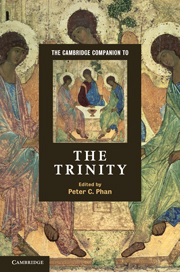Book contents
- Frontmatter
- Contents
- Notes on contributors
- Preface
- Part I Introduction
- Part II Retrieving the sources
- Part III Renewing the tradition
- Part IV Contemporary theologians
- 10 Karl Barth, reconciliation, and the Triune God
- 11 Mystery of grace and salvation: Karl Rahner's theology of the Trinity
- 12 Hans Urs von Balthasar on the Trinity
- 13 The trinitarian doctrines of Jürgen Moltmann and Wolfhart Pannenberg in the context of contemporary discussion
- 14 Sophia, apophasis, and communion: the Trinity in contemporary Orthodox theology
- 15 The life-giving reality of God from black, Latin American, and US Hispanic theological perspectives
- 16 Feminist theologies and the Trinity
- Part V In dialogue with other religions
- Part VI Systematic connections
- Index
- References
10 - Karl Barth, reconciliation, and the Triune God
from Part IV - Contemporary theologians
Published online by Cambridge University Press: 28 July 2011
- Frontmatter
- Contents
- Notes on contributors
- Preface
- Part I Introduction
- Part II Retrieving the sources
- Part III Renewing the tradition
- Part IV Contemporary theologians
- 10 Karl Barth, reconciliation, and the Triune God
- 11 Mystery of grace and salvation: Karl Rahner's theology of the Trinity
- 12 Hans Urs von Balthasar on the Trinity
- 13 The trinitarian doctrines of Jürgen Moltmann and Wolfhart Pannenberg in the context of contemporary discussion
- 14 Sophia, apophasis, and communion: the Trinity in contemporary Orthodox theology
- 15 The life-giving reality of God from black, Latin American, and US Hispanic theological perspectives
- 16 Feminist theologies and the Trinity
- Part V In dialogue with other religions
- Part VI Systematic connections
- Index
- References
Summary
It has become commonplace to attribute the twentieth-century recovery of the doctrine of the Trinity to the Swiss theologian Karl Barth (1886–1968). Barth, though not alone, was indeed a major figure in the modern trinitarian renaissance. In his massive Kirchliche Dogmatik (Church Dogmatics), published in fourteen volumes from 1932 to 1967, Barth developed and expounded the thesis that the doctrine of the Trinity was foundational for Christian theological discourse. In the inaugural volume, he argued, “The doctrine of the Trinity is what basically distinguishes the Christian doctrine of God as Christian, and therefore what already distinguishes the Christian concept of revelation as Christian, in contrast to all other possible doctrines of God and concepts of revelation” (Church Dogmatics, i/1, 301). These words are emblematic of Barth's effort to place the doctrine of the Trinity back in the center of Christian theology. Indeed, following his own advice, Barth placed the doctrine of the Trinity at the very beginning of the Church Dogmatics, arguing that it constituted the internal dynamic of God's speech to humanity and as such functioned as the basic grammar of Christian discourse.
- Type
- Chapter
- Information
- The Cambridge Companion to the Trinity , pp. 173 - 191Publisher: Cambridge University PressPrint publication year: 2011
References
- 2
- Cited by



